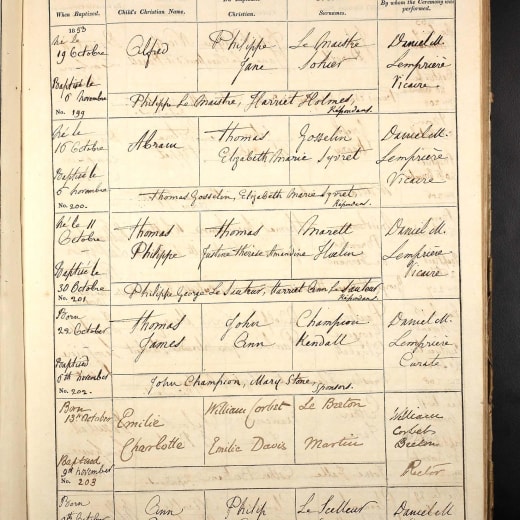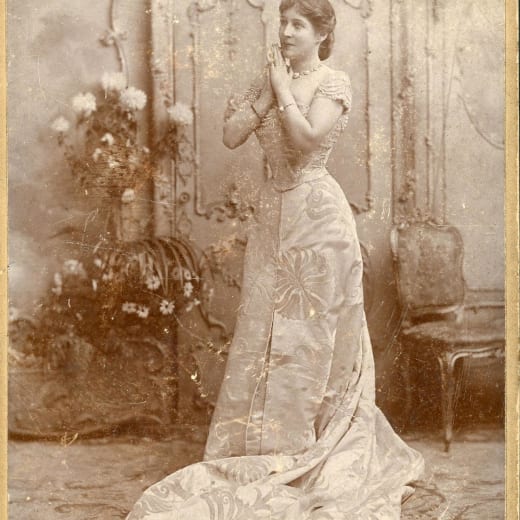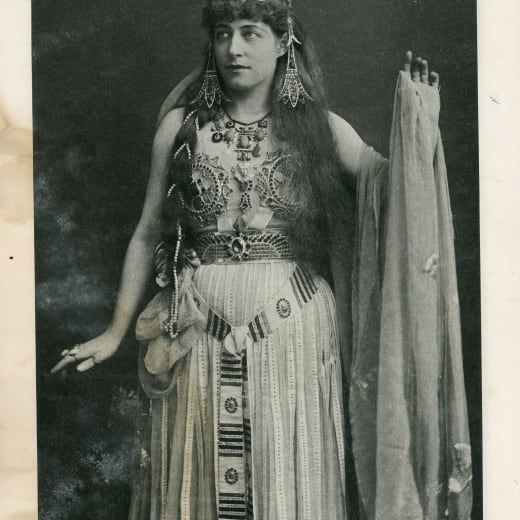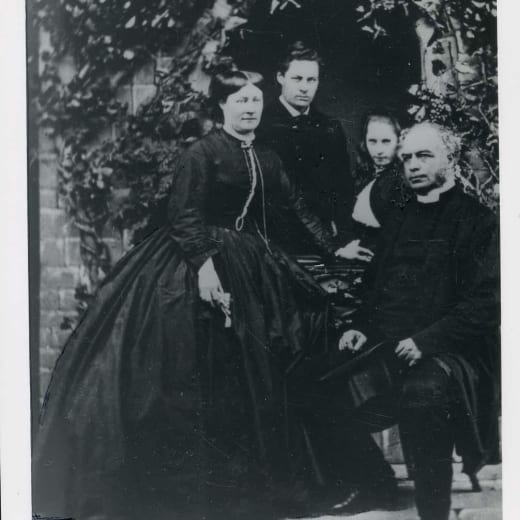
Every age has its own idea of beauty and in Lillie Langtry we have the epitome of a late 19th century "pinup"
Lillie was born Emilie Charlotte Le Breton in 1853, her father William Corbet Le Breton, was the Dean of Jersey and Rector of St Saviour and she grew up at the Parish Rectory.
She was known as Lillie after her own childish attempts to pronounce Emilie and was the only girl in a family of six boys. ‘Living the life of my brothers transformed me into an incorrigible tomboy. I could climb trees and vault fences with the best of them, and I entered with infinite relish into their practical jokes’. She received the same education as her brothers and had lessons for Latin, Mathematics, Greek, German, French, Music and Drawing.
In March 1874 Lillie married Edward Langtry, a wealthy widower and the heir to a Belfast shipbuilding family. By the end of that year, they had moved to London where her beauty soon became the talk of society.
Lillie became the first acknowledged mistress of the Prince of Wales, later King Edward VII, yet she remained friendly with his wife, Princess Alexandra. The Prince had other mistresses but his friendship with Lillie remained strong until his death in 1910.
Lillie also had a relationship with Prince Louis of Battenberg, by whom she had a daughter, Jeanne. Financial difficulties led to Lillie taking to the stage in the 1880s. While she was not a great actress, she was a crowd puller, because of her beauty and her notoriety.
After divorcing Edward Langtry, she married Hugo de Bathe, nineteen years her junior, at St Saviour’s Church in 1899. In 1907 she became Lady de Bathe on the death of her father-in-law. She died in February 1929 at her home in Monte Carlo and her body was brought back to Jersey to be buried in St Saviour’s Churchyard.
Lillie and the Theatre
Lillie’s lifestyle was threatened in the early 1880s by financial difficulties and Oscar Wilde suggested that she take to the stage in order to have some income. He brought her to the attention of actress Henrietta Hodson. Her first appearance was for a charity performance of A Fair Encounter at Twickenham Town Hall on 19th November 1881.
Although Lillie found her first stage experience to be nerve-racking, she was persuaded to continue and her next role as Kate Hardcastle in She Stoops to Conquer was watched by the rank and file of London, including the Prince and Princess of Wales. It was a triumphant performance and she was asked by the Haymarket Theatre to join their theatrical company.
Once Lillie had finished her engagements, she embarked on a tour of the provinces during 1882, with her own company and four plays; She Stoops to Conquer, Ours, Peril and As You Like It. Lillie was acclaimed in all cities.
Following this success, Henry E Abbey planned a tour of the United States, and he paid Lillie a higher percentage of the tour receipts than any other actress at the time. Despite her initial reservations, Lillie grew to love America and her company toured every year between 1882 and 1887. Indeed, Lillie boasted ‘I can hardly put my finger on any town sufficiently important to be marked on the map in which I have not played more than once’.
Lillie struck up a friendship with the very wealthy Freddie Gerhard and during 1886 they embarked on a three-month tour of Europe, where the company was received by most of the crowned heads of Europe. Whilst touring America, Lillie had a personal railway carriage built for her and paid for by Freddie. Lillie also invested in land, buying a ranch in California, and bought a well-stocked racing-stable. Lillie’s time in America was financially very successful which enabled her to divorce Edward Langtry in 1884 and become a naturalised American Citizen three years later.
In 1891, Lillie leased the St James Theatre where her performance of Rosalind in As You Like It was sold out for four months and then she leased the Princes Theatre where she produced and starred in Anthony and Cleopatra. Despite her long absence from the London stage, her performance as Cleopatra drew great reviews, The Telegraph called her the ‘finest Cleopatra of our time’ and the first night audience made her take fourteen curtain calls. Lillie finally accepted an invitation to take to the stage in Jersey in 1891 and played Rosalind to rapturous reception.
She returned to the island in 1900 when she officially opened the refurbished Opera House with a performance of The Degenerates to great acclaim ‘the whole performance was a veritable triumph’.
In 1901, Lillie bought the Imperial Theatre in London. She spent nearly £50,000 refurbishing it but was forced to sell it at a loss soon after.
In 1905 Lillie embarked on a six-month tour of South Africa and although she did not particularly enjoy it, it was a financial success. Times and tastes were changing, and Lillie changed with them, in 1906, she made her first appearance in vaudeville.
It was about this time that Lillie is credited with starting a theatrical tradition – the red carpet – for whilst appearing in a play, she asked the manager of the theatre to lay a carpet from her dressing room to the stage in order to keep the hems of her dresses from getting dirty. The carpet happened to be red and it is said that Lillie’s request started the tradition of laying out the red carpet.
Lillie intermittently played in vaudeville shows until 1913 when she made her one and only film, the comedy drama His Neighbours Wife. The silent film opened to acclaim, though Lillie never made another film. Despite a few performances in aid of the Red Cross during the First World War, Lillie did not perform on stage again after this
Lillie’s Friendship with Royalty
Lillie became the mistress of the Prince of Wales soon after she was introduced to him by Sir Allen Young and from then on, the Langtry social diary closely followed that of the Prince of Wales.
They enjoyed each other’s company and were often seen taking dawn rides in Hyde Park. The Prince had a house built in Bournemouth, called ‘The Red House’, where they could be together. He even arranged for Lillie to be presented at Court to his mother, Queen Victoria.
Their relationship continued until 1879, when the affair became public when a magazine claimed that Edward Langtry had named Bertie as co-respondent in a divorce case. Despite printing a retraction, the magazine’s editor was sued for libel, found guilty and sentenced to 18 months in prison. However, the damage had been done and the relationship between Lillie and the Prince was ended, but they remained friends and continued to keep in touch even after he became king.
Lillie enjoyed another royal liaison – this time with Prince Louis of Battenburg whom she knew through the Prince of Wales. The relationship did not last long but Lillie became pregnant. Unable to stay in London or Jersey for fear of discovery Lillie went to Paris, where her daughter Jeanne-Marie was born in secret.
The baby was returned to Jersey with her grandmother and was brought up believing that Lillie was her aunt. It was only in her teens that Jeanne-Marie was told the truth and even then, the identity of her father remained secret until just a few days before her marriage to Sir Ian Malcolm. On discovering her true parentage, Jeanne-Marie estranged herself from her mother and from then on, treated her like a stranger.
Lillie and her Influence
Lillie’s beauty and charisma inspired painters like Millais, Poynter and Miles and poets like Rudyard Kipling and Oscar Wilde. For a while Lillie seemed everywhere – women wore the ‘Langtry knot’ and the ‘Langtry shoe’ mimicking Lillie’s style of dress. Special dances such as the “Langtry Waltz” were written for her and became a favourite of London Society. She also became an advertising magnet and became the face of Pear’s Soap and the voice of Dr Marmaduke Purcell’s Voice Lozenge.
Lillie Langtry’s influence was widespread and was at its height when she became an actress. Tiffany & Co. fashioned a belt buckle in honour of her 1901 tour of the United States and buttons from her dresses became highly valuable objects.
Lillie so fascinated Judge Roy Bean that he named his saloon in South Texas the Jersey Lily. Bean also claimed that he named his town of Langtry in honour of Lillie, although some say that the town was actually named after a railway engineer called Langtry and the name was just a coincidence.
Explore
Lillie Langtry at Jersey Museum
We’ve got a number of Lillie’s possessions on display at Jersey Museum including, costume jewellery that she wore during her stage career, a fan-shaped box, a Tiffany belt buckle, signed photographs and her impressive travelling case (pictured).













